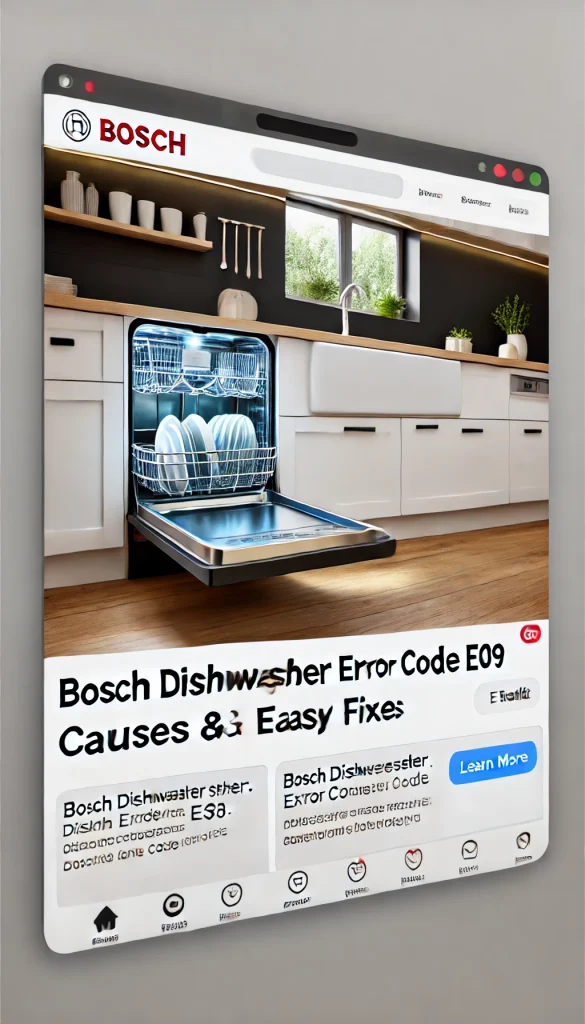Imagine this: It’s a quiet evening. You’ve just finished a fantastic dinner, and instead of dreading the sink full of dishes, you’re ready to let your trusty Bosch dishwasher do the heavy lifting. You load it up, press start, and… beep-beep. What’s that? Error code E09 flashes on the screen. Your dishwasher has decided it’s time for a mystery, not a rinse cycle.
Relax. You’re not alone in this. Bosch dishwashers are known for their efficiency and reliability, but like any tech, they have their quirks. Error codes are their way of saying, “Hey, something’s up!” And E09? That’s a specific shout-out to a heating problem.
But what does this mean, and how do you fix it without diving into a sea of technical jargon? That’s where this guide comes in. We’ll break it all down, step by step. No tech degree needed. Ready? Let’s dive in.
What Does Bosch Error Code E09 Really Mean?
Ever felt like your dishwasher has its own secret language? Well, E09 is one of those messages. To put it simply, it means the dishwasher isn’t heating the water properly. If you’re wondering, “Why does it even matter?”—think about it. Without hot water, your dishes won’t get that squeaky-clean finish you love.
This code is often linked to a fault in the dishwasher’s heating element. Picture it as the heart of the heating system. If it’s not pumping out the heat, your dishwasher can’t do its job. But wait—how does a heating element just stop working? Let’s unravel that mystery in the next section. Stay tuned.
Why Does Error Code E09 Happen?
Alright, so we know E09 is the dishwasher’s way of saying, “Hey, I’m not heating up like I should.” But why does this happen in the first place? Let’s break it down.
First, the usual suspect: the heating element. Think of it like the electric kettle’s coil. It warms up the water so your dishes can sparkle. Over time, this component can burn out or get damaged. It’s like when a lightbulb suddenly decides its time is up—one moment it’s fine, and the next, nada.
Another possibility? Limescale buildup. If you live in an area with hard water, minerals can accumulate on the heating element. Imagine trying to bake cookies with a dirty oven—it just won’t perform as it should. The same goes for your dishwasher.
And here’s a wild card: electrical issues. The wiring that connects the heating element to the dishwasher’s control panel could be faulty. If the wiring’s damaged or loose, the signal saying, “Time to heat up!” might not even reach the element.
So, what do you do? Do you need to grab your toolbox, or is this a call-the-expert situation? Don’t worry, we’ll cover that next. Let’s keep things simple and actionable.
What Can You Do About It?
Here’s the million-dollar question: how do you fix error code E09? First, don’t panic. While it sounds intimidating, there are steps you can take to figure out what’s wrong.
1. Check for visible damage.
Unplug the dishwasher (safety first!) and take a peek inside. Is there any visible wear on the heating element? Does it look burnt or corroded? If so, that’s likely your culprit.
2. Look for limescale.
If you suspect hard water buildup, grab some white vinegar or a dishwasher cleaning product. Run an empty cycle with the cleaner to see if it clears the issue. Think of it as giving your dishwasher a spa day.
3. Test the heating element.
This step might need a bit more confidence—or a multimeter. Testing the heating element for continuity (a fancy way of checking if it’s still alive) can confirm if it’s working. If you’re not sure how to do this, don’t sweat it—calling a professional is always an option.
4. Call for backup.
If all else fails, reach out to Bosch customer support or a qualified technician. Sometimes it’s better to let the pros handle the tricky stuff, especially if the wiring is involved.
Preventing E09 in the Future
So, now you’ve tackled the dreaded E09 error, but let’s talk about the real win—keeping it from happening again. After all, no one likes interruptions when you’re relying on your dishwasher to handle the post-dinner chaos.
1. Fight the limescale battle.
If hard water is a guest in your home, it’s time to take action. Using a water softener or regularly running a cleaning cycle with white vinegar or a commercial descaler can prevent mineral buildup on the heating element. Think of it as a little TLC for your dishwasher.
2. Don’t skip maintenance cycles.
Most dishwashers have self-cleaning options or cleaning cycles. Run one every month or so to keep things running smoothly. This isn’t just for the heating element; it’s like giving your dishwasher a tune-up.
3. Load with love.
Overloading the dishwasher can make it work harder than it should. While this won’t directly fry the heating element, it can strain the system, which isn’t great in the long run. Plus, your dishes might not even get clean—double loss.
4. Keep an eye out for trouble.
Notice your dishwasher acting up? Dishes coming out cold or still dirty? These might be early signs that the heating element isn’t pulling its weight. Catching these signs early can save you from dealing with full-on E09 drama.
Wrapping It All Up
Dishwasher error codes might seem like hieroglyphics at first, but with a little guidance, they’re just a way of pinpointing what needs attention. Error code E09? It’s all about the heating element and water not getting hot enough.
By understanding what causes the problem, tackling it head-on, and taking steps to prevent it, you’re setting your dishwasher up for success. And let’s be honest—when your dishwasher is happy, you’re happy. Fewer problems, cleaner dishes, and more time to enjoy whatever comes after dinner.
Have you faced the E09 code before, or maybe another error code? Drop your dishwasher woes (or victories!) in the comments below. Let’s troubleshoot together!

